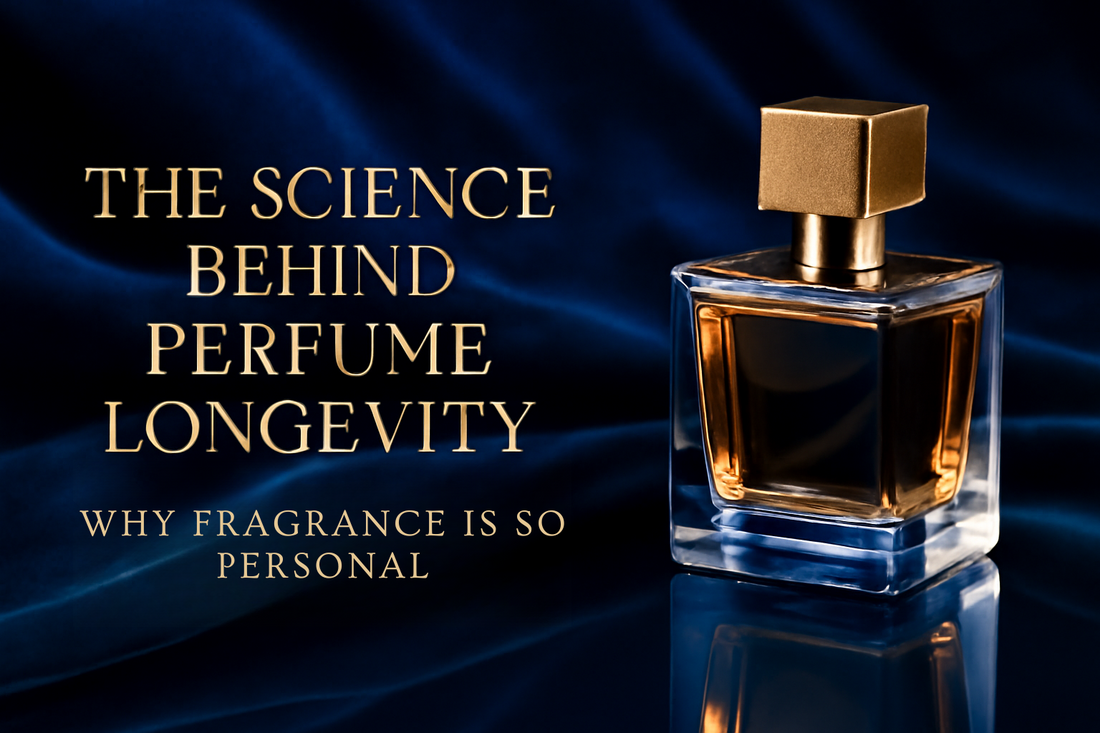
The Science Behind Perfume Longevity: Why Fragrance Is So Personal
Share
“How long will this perfume last?”
It’s one of the most common questions in the world of fragrance — yet it doesn’t have a universal answer. Perfume longevity is not a fixed number printed on the box; it’s a complex interaction between biology, chemistry, neuroscience, psychology, and environment.
At Luxora, we believe understanding this makes wearing perfume even more captivating. Let’s explore why no two people ever experience the exact same scent in the same way.
1. Your Skin: The Living Canvas
Perfume doesn’t just sit on your skin — it reacts with it.
- pH Balance: Human skin is slightly acidic (usually between 4.5–5.5). This acidity influences how fragrance molecules break down. Slightly different pH levels can make a scent last for hours on one person but fade quickly on another.
- Natural Oils: Fragrance binds to sebum (the oil your skin produces). Oily skin tends to hold scent longer, while dry skin lets it evaporate more quickly. Moisturising before applying perfume can help it last.
- Heat & Sweat: Perfume molecules evaporate with heat. People with naturally warmer skin, higher metabolism, or those who sweat more may find their fragrance projects strongly at first but disappears sooner. Sweat itself contains salts and proteins that can alter how notes develop.
- Microbiome: Each person’s skin is home to billions of microorganisms. These interact with perfume molecules in unique ways, subtly changing the scent from one person to another.
2. The Chemistry of Perfume
Fragrance longevity also depends on the perfume’s composition:
- Light Notes (Citrus, Green, Aquatic): These molecules are small and volatile, meaning they evaporate quickly. They give freshness but fade faster.
- Medium Notes (Florals, Fruits, Spices): These form the “heart” of a perfume and last longer than top notes, but eventually soften.
- Heavy Notes (Amber, Oud, Musk, Vanilla, Woods): Dense and complex, these are the molecules that linger for hours — sometimes days. Oud in particular is one of the most powerful and enduring raw materials in perfumery, prized for its deep, resinous richness. Even in small amounts, it anchors a fragrance with remarkable staying power.
Eau de Toilette vs. Eau de Parfum
Concentration plays a role too — but not in the way many people think.
- Eau de Toilette (EDT): With a lower oil concentration, EDTs often highlight bright top and heart notes. They feel luminous, fresh, and airy, which can make them seem shorter-lived — but on the right skin or clothing, they can perform beautifully. Many iconic perfumes are EDT by design.
- Eau de Parfum (EDP): With a higher oil concentration, EDPs usually lean into base-heavy molecules like oud, amber, and musk, giving a richer, denser impression that often lasts longer.
Rather than thinking of one as “stronger” and the other “weaker,” it’s best to see them as different interpretations: EDT as radiant and sparkling, EDP as velvety and enveloping. Both have their place in a fragrance wardrobe.
3. Environment & Lifestyle
Where and how you wear your fragrance matters as much as what’s in the bottle:
- Climate: Hot, humid air makes perfume project more strongly but also evaporate faster. Cold, dry air slows evaporation but keeps scent closer to the skin.
- Air Movement: Wind or air-conditioning can disperse molecules quickly, reducing longevity.
- Fabric vs. Skin: Perfume lasts longer on fabric because fibres trap and slowly release molecules. On skin, chemistry is always changing.
- Lifestyle: Exercise, stress, and hormones all influence how perfume interacts with your body chemistry.
4. Neuroscience: Why You Stop Smelling Your Perfume
Sometimes a perfume feels like it has disappeared — but others can still smell it on you. This is due to olfactory adaptation (also called olfactory fatigue).
Your brain tunes out familiar smells to prevent sensory overload. From a survival perspective, it allows you to notice new scents (like smoke or danger) instead of constantly focusing on your own perfume.
So the fragrance hasn’t always vanished — your brain has simply filtered it out. This makes perfume not only a chemical experience but also an extraordinary neurological one.
5. Psychology: Longevity Is Also Perception
Perfume is not only about molecules; it’s also about how you experience them.
- Mood: Stress or distraction can make you notice your fragrance less, while relaxation can enhance perception.
- Memory & Emotion: Perfumes tied to strong memories often feel more powerful or longer-lasting because they trigger emotional pathways in the brain.
- Expectations: If you believe a fragrance is a “beast mode” scent, you may perceive it as stronger, even if its chemistry is similar to others.
Perfume lives in both your biology and your psychology — a deeply unique expression of self.
6. The Uniqueness of You
From your skin’s oils to your microbiome, from your brain’s adaptation to your mood, there are countless reasons why perfume longevity is unpredictable. The same bottle will tell a different story on every skin, in every season, in every moment.
That is not a flaw — it is the very enigmatic nature of fragrance.
✨ The Luxora Takeaway ✨
At Luxora, we believe perfume longevity cannot be reduced to a number of hours. Fragrance is alive — shaped by science, transformed by your biology, and enriched by your emotions.
Each perfume in our collection is handpicked for its extraordinary quality, with detailed descriptions of top, heart, and base notes to help you understand exactly what you’re experiencing. We only offer bestsellers — fragrances that have earned their place for their ability to last and captivate.
Ready to discover your signature scent? Shop Now All Our Fragrance Collection and find out why fragrance is so personal at Luxora.
💎 100% Authentic · EAN Verified · Carefully Curated
